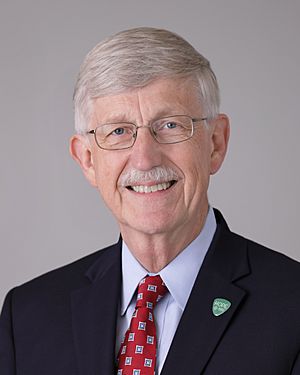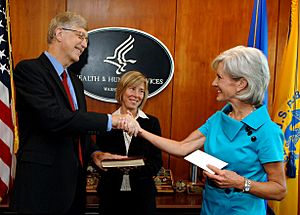Francis Collins facts for kids
Quick facts for kids
Francis Collins
|
|
|---|---|

Official portrait, 2017
|
|
| Science Advisor to the President | |
| Acting February 18, 2022 – October 3, 2022 |
|
| President | Joe Biden |
| Preceded by | Eric Lander |
| Succeeded by | Arati Prabhakar |
| 16th Director of the National Institutes of Health | |
| In office August 17, 2009 – December 19, 2021 |
|
| President | Barack Obama Donald Trump Joe Biden |
| Deputy | Lawrence A. Tabak |
| Preceded by | Raynard S. Kington (acting) |
| Succeeded by | Lawrence A. Tabak (acting) |
| 2nd Director of the National Human Genome Research Institute | |
| In office April 1993 – August 1, 2008 |
|
| President | Bill Clinton George W. Bush |
| Preceded by | Michael M. Gottesman (acting) |
| Succeeded by | Alan Edward Guttmacher (acting) |
| Personal details | |
| Born |
Francis Sellers Collins
April 14, 1950 Staunton, Virginia, U.S. |
| Spouse | Diane Baker |
| Children | 2 |
| Education | University of Virginia (BS) Yale University (MS, PhD) University of North Carolina, Chapel Hill (MD) |
| Scientific career | |
| Fields | Molecular genetics |
| Institutions |
|
| Thesis | Semiclassical theory of vibrationally inelastic scattering, with application to H+ + H₂ (1974) |
| Doctoral advisor | James Cross |
Francis Sellers Collins (born April 14, 1950) is an American doctor and scientist famous for discovering the genes connected to several diseases. He is best known for leading the Human Genome Project, a huge international effort to map out all of human DNA.
Collins served as the director of the National Institutes of Health (NIH) for 12 years, from 2009 to 2021. The NIH is the main U.S. government agency responsible for medical research. He worked under three different presidents: Barack Obama, Donald Trump, and Joe Biden.
Before leading the NIH, Collins was in charge of the National Human Genome Research Institute (NHGRI). There, he led the project that read the entire human genetic code for the first time. He has received many honors for his work, including the Presidential Medal of Freedom. Collins has also written popular books about science and his Christian faith.
Contents
Early Life and Education
Francis Collins was born in Staunton, Virginia. He grew up on a small farm and was home schooled by his mother until the sixth grade. As a young student, he loved chemistry and wasn't very interested in biology, which he thought was "messy."
He earned a degree in chemistry from the University of Virginia in 1970. He then went to Yale University and earned a PhD in physical chemistry. While at Yale, a class in biochemistry sparked his interest in the science of living things. He decided to change his career path and went to medical school at the University of North Carolina at Chapel Hill. He became a medical doctor in 1977.
Scientific Discoveries
Hunting for Genes
In the 1980s, Collins became known as a "gene hunter." He developed a powerful new method called "positional cloning" to find specific genes that cause diseases. Genes are like instructions in our DNA that tell our bodies how to work. When a gene has a mistake, it can lead to a disease.
One of his first major successes was finding the gene for cystic fibrosis in 1989. This was a huge breakthrough that helped doctors and scientists understand the disease better. After that, Collins and his teams found the genes responsible for other conditions, including:
- Huntington's disease
- Neurofibromatosis (a condition that causes tumors to grow on nerves)
- Hutchinson–Gilford progeria syndrome (a rare disease that causes children to age very quickly)
Leading the Human Genome Project

In 1993, Collins was chosen to lead the Human Genome Project. This was one of the biggest scientific projects in history. The goal was to read and map all the genes of a human being, known as the human genome. Think of it as creating a complete instruction book for building a human.
In 2000, Collins stood with President Bill Clinton to announce that a "working draft" of the human genome was complete. Collins said, "It is humbling for me, and awe-inspiring to realize that we have caught the first glimpse of our own instruction book, previously known only to God." The final, more complete version was finished in 2003.
This project changed medicine forever. It helps scientists find the causes of diseases and develop new treatments.
Director of the National Institutes of Health (NIH)
In 2009, President Barack Obama appointed Collins as the director of the NIH. He was so respected that he was asked to stay in the job by President Donald Trump and then by President Joe Biden.
As director, Collins oversaw many important research projects. These included:
- The BRAIN Initiative: A project to map the human brain to understand diseases like Alzheimer's and autism.
- The All of Us Research Program: A program to gather health data from one million people to study how our genes, lifestyle, and environment affect our health. This helps create personalized medicine, where treatments are designed just for you.
- Cancer Moonshot: An effort to speed up cancer research and find new ways to treat and prevent cancer.
Collins also worked to make sure that genetic information is kept private. He helped pass a law that prevents employers and insurance companies from treating people unfairly based on their genes.
On October 5, 2021, Collins announced he would step down as NIH director. He officially left the position on December 19, 2021.
Science and Faith
Collins is a devout Christian and has written and spoken a lot about how his faith and his work in science fit together. He was not always religious. In college and graduate school, he considered himself an agnostic, meaning he wasn't sure if God existed.
He began to explore faith after talking with a patient. He read books by authors like C. S. Lewis and eventually became a Christian.
In his bestselling book, The Language of God: A Scientist Presents Evidence for Belief, Collins explains that he believes science and faith can work together. He rejects ideas like Young Earth creationism (the belief that the Earth is only a few thousand years old). Instead, he supports theistic evolution, the idea that God used the process of evolution to create life.
In 2007, he started The BioLogos Foundation, an organization that encourages conversations about the harmony between science and faith.
Music and Hobbies
Outside of the lab, Collins loves to play the guitar and ride his motorcycle. While working at the NIH, he started a rock band with other scientists called the "Directors." The band would play at events, often with funny lyrics about science. This showed his fun side and his belief that scientists can have creative hobbies too.
Awards and Recognition
Dr. Collins has received many of the nation's highest honors for his work.
- In 2007, President George W. Bush awarded him the Presidential Medal of Freedom, the highest honor a civilian can receive.
- In 2008, he received the National Medal of Science.
- In 2020, he was awarded the Templeton Prize, a major award given to a person who has made a special contribution to "affirming life's spiritual dimension."
- He was also elected as a Foreign Member of the Royal Society in the United. Kingdom, a high honor for scientists.
Books
- Principles of Medical Genetics, 2nd Edition (1998)
- The Language of God: A Scientist Presents Evidence for Belief (2006)
- The Language of Life: DNA and the Revolution in Personalized Medicine (2010)
- Belief: Readings on the Reason for Faith (2010)
- The Language of Science and Faith: Straight Answers to Genuine Questions (2011)
- The Road to Wisdom: On Truth, Science, Faith, and Trust (2024)
See also
 In Spanish: Francis Collins para niños
In Spanish: Francis Collins para niños
- List of events in National Human Genome Research Institute history
- Science and religion
 | Janet Taylor Pickett |
 | Synthia Saint James |
 | Howardena Pindell |
 | Faith Ringgold |

